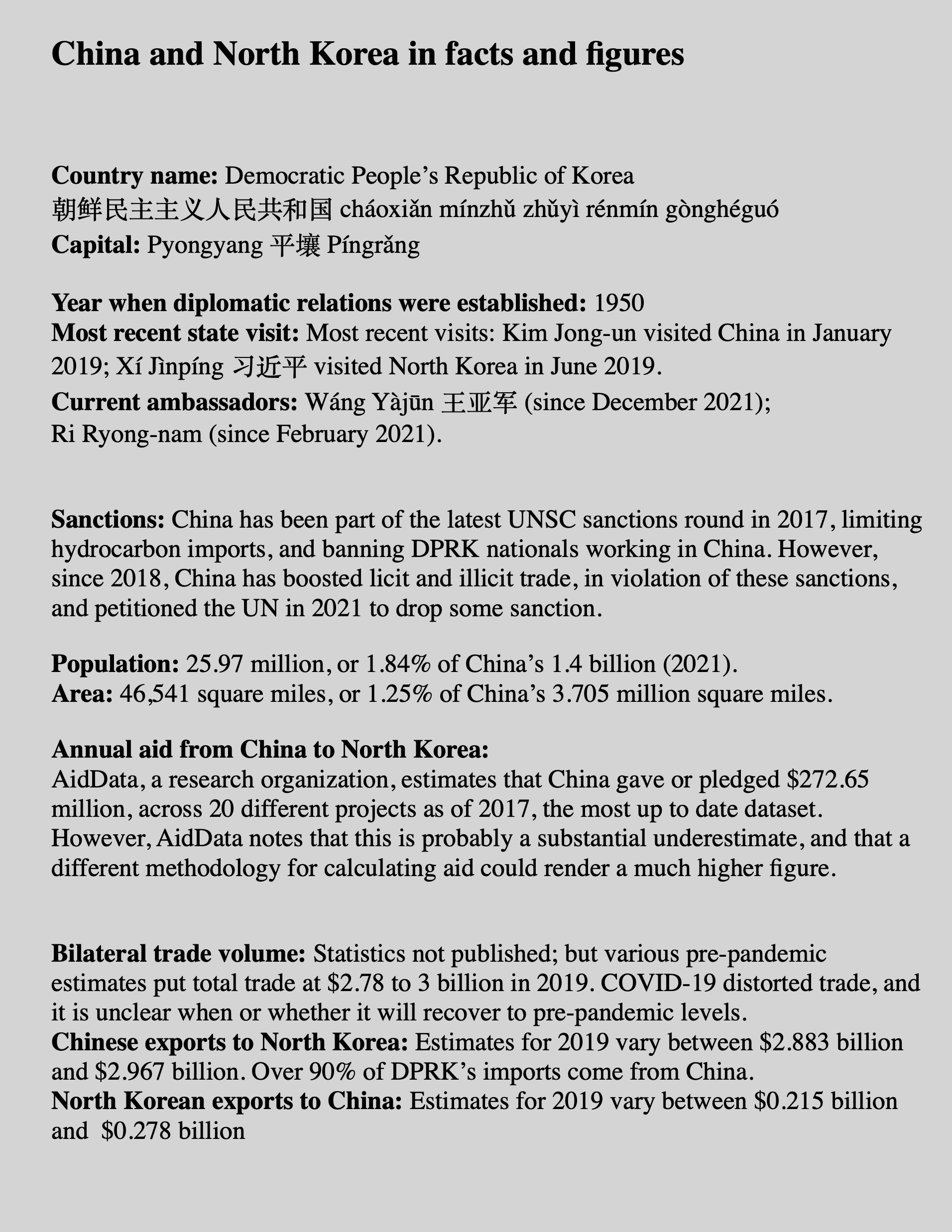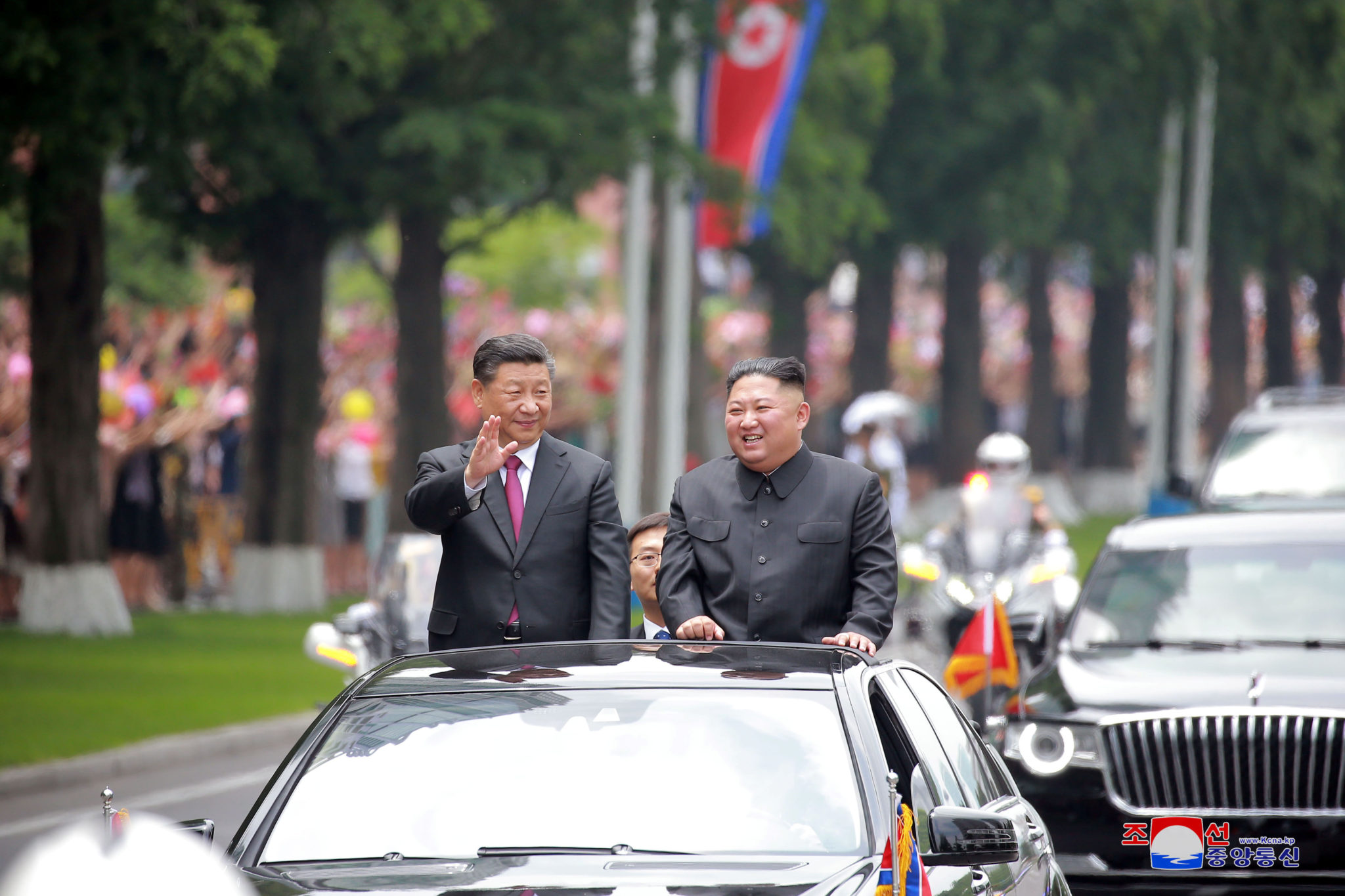In the first of China’s World, our monthly series on China’s key relationships with other countries, Duncan Bartlett focuses on the P.R.C.’s links with the hungry and isolated nation of North Korea.
The current state of play
No matter how dire the situation is for people in North Korea, state TV continues to give the impression that military parades delight patriotic citizens, who are bursting with adoration for Kim Jong-un and his family.
Official photographs disseminated by the propaganda department on February 10 showed a large rocket carried on an 18-wheel launcher. It is suspected of being a solid-fuel intercontinental ballistic missile.
A week or so later, a huge rocket landed in the Sea of Japan near the island of Hokkaido. The Japanese Defense Minister warned it was likely to have a range of 14,000 km, enough to reach anywhere in the United States.
 Kim Yo-jong, the powerful sister of leader Kim Jong-un, appeared on TV warning of a “strong and overwhelming” response to any “hostile” acts against her country.
Kim Yo-jong, the powerful sister of leader Kim Jong-un, appeared on TV warning of a “strong and overwhelming” response to any “hostile” acts against her country.
She added that North Korea could turn the Pacific into a “firing range,” prompting the Japanese prime minister, Fumio Kishida, to call for an immediate response from the UN Security Council. The meeting, which was held in New York on February 20, considered issuing an official condemnation of North Korea and tighter sanctions on the regime. However, both proposals were blocked by two of the council members: Russia and China.
China’s Deputy U.N. Ambassador Dài Bīng 戴兵 said that further sanctions on North Korea would only lead to a diplomatic dead end. “China genuinely hopes for stability, rather than chaos on the peninsula. China calls on all parties to remain cool-headed and restrained,” Dai said.
This frustrated the United States, as any official response from the U.N. Security Council needs to be agreed through consensus.
“The reality is that those who shield the DPRK (North Korea) from the consequences of its escalatory missile tests put the Asian region and entire world at risk of conflict,” said U.S. Ambassador to the U.N., Linda Thomas-Greenfield.
She added: “The council’s lack of action is worse than shameful. It is dangerous.”
China’s position on North Korea
What is the true nature of the relationship between North Korea and China? China entered the Korean War in support of the North in 1950, and since then the DPRK has often been called China’s closest ally. But the relationship has, in more recent years, come under strain because of North Korean nuclear testing and other factors.
Are the two countries comrades or rivals? Is there any point in U.S. President Joe Biden asking Xí Jìnpíng 习近平 to pressure the North Koreans into stopping the nuclear tests?

“If North Korea conducts a seventh nuclear test — which could happen at any time — it will be a game-changer, in the sense that North Korea could develop and deploy tactical nuclear missiles,” the South Korean Foreign Minister, Park Jin, told the Munich Security Conference on February 19.
In briefings with reporters in Washington, Pentagon officials have said they doubt the North Koreans will be too worried about upsetting China by carrying out a nuclear test before or during the Two Sessions political meeting, which is due to take place in Beijing in March.
It is understandable that the Pentagon is puzzled by the dynamic between North Korea and China.
“It has always had a complicated relationship,” Naoko Aoki, an Associate Political Scientist at the Rand Corporation, told The China Project in an interview. “The ties have been close at times, while at other times the situation has been chilly. Yet in the current geopolitical environment it makes sense for the two countries to forge closer ties.”
North Korean border closed for COVID, causing food insecurity
Aoki points out that China is vital for the North Korean economy as a key supplier of food, fuel, and aid. However, North Korea became increasingly isolated when it chose to close its borders to prevent the spread of COVID. There are signs this has led to acute food shortages.
The ruling Workers’ Party of Korea held a meeting in February to discuss urgent issues related to food production. The previous meeting on the issue was just over two months ago, in late December.
“North Korea closed off its borders early into the pandemic and it still maintains strict controls. It remains to be seen how North Korea will try to balance public health and economic needs,” Akoi said.

Advanced weapons displayed by North Korea spell danger
The military parade which took place in Pyongyang in February showcased at least 11 liquid-fuel Hwasong-17 intercontinental ballistic missiles (ICBMs) as well as the new apparent solid-fuel ICBM. The BBC reported that analysts believe this could potentially challenge the defense systems of the United States.
Aoki told the China Project “If the Hwasong-17 ICBMs can be armed with multiple nuclear warheads, they could potentially overwhelm the U.S. ballistic missile systems designed to protect the homeland, at least in theory.”
However she qualified her warning by saying that “there are a lot of unknowns here, so I would not think of this as an established fact. However, the big picture here is that North Korea is continuing to make progress in terms of missile production, which complicates the defense of the United States and its allies in the region.”
She notes that the new apparent solid-fuel ICBM which appeared in the parade was predicted in a military modernization plan published two years ago.
“I think the North Korean determination to pursue more advanced capabilities should be taken seriously by the international community,” Dr Aoki told us.
Biden wants the U.S., South Korea and Japan to work together to deter North Korea
Under the Biden Administration, the United States has put great effort into convincing its Japanese and South Korean allies to unite in meeting the threat posed by North Korea. There is currently no diplomatic dialogue between the North and the South.

The U.S. and South Korean militaries carried out joint air drills this month and the two countries have agreed to resume field training for the first time in five years during this spring’s regular combined military exercises.
Meanwhile, Japan is doubling its defense budget and acquiring long-range missiles from the United States.
The U.S. has also been encouraging Japan and South Korea to set aside historical grievances and enhance their trilateral security cooperation, with North Korea high on the agenda.
China takes a dim view of this, believing it is part of a plan by the U.S. to contain the rise of the P.R.C. and create geopolitical blocs, leading to a standoff, similar to that of the Cold War. This means China has little incentive to cooperate when it comes to North Korea.
Xi Jinping and Kim Jong-un praise each other publicly
North Korean state media has been effusive in its praise of Xi Jinping. An editorial published in the Rodong Sinmun in October 2022 stated: “The friendship between North Korea and China, which has a long history and tradition, will continue to be maintained under the wise leadership of the Supreme Leaders of the two parties and two countries, developing further and responding to the needs of the times.”
In return, Chinese state media expressed admiration for Kim Jong-un.
Professor Atsuhito Isosaki, who researches North Korea at Keio University in Japan, believes that alongside the praise, China also sends North Korea subtle messages encouraging restraint. He said that although Beijing turns a blind eye to missile launches, it is resolutely opposed to nuclear tests.
“China is concerned about a ‘nuclear domino effect,’ in which North Korea’s possession of nuclear weapons leads to rising public support for the acquisition of nuclear weapons in South Korea, Japan, and even Taiwan,” Isozaki wrote in the Diplomat.
There is another danger for China: North Korea’s nuclear test site is not far from its border. Nuclear tests could cause an earthquake or spread radiation.
China thus has good reason to want to curb a North Korean nuclear weapons program. It is a topic which is likely to be raised by Secretary of State Antony Blinken if he decides to visit Beijing later this year.







